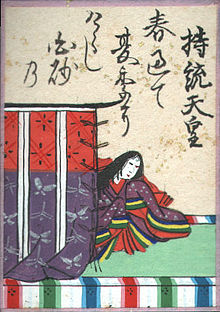Jitō


Jitō ( Japanese 持 統 天皇 , Jitō-tennō ; * 645 ; † January 13, 703 ) was the 41st Tennō of Japan from 686 to 697.
Life
She was a daughter of Tenji- tennō and married Temmu , the then crown prince and younger brother of her father. After the death of Temmu-tennō, she took over the office of Tennō and continued her husband's reforms. She continued to reside in her husband's Kiyomihara Palace until she moved the capital from Asuka-kyō to Fujiwara-kyō (today: Kashihara , Nara Prefecture ) in 694 .
She was known for her strong character and wisdom. Some researchers suspect that the image of the sun goddess Amaterasu in the history books Kojiki and Nihonshoki , the writing of which was begun in Jito's time, reflects the figure of this Tenno.
Jitō had a son from Temmu, named Kusakabe. Prince Kusakabe became the Crown Prince Temmus, but he died before he could take the throne. Karu no Miko, the son of Kusakabe, was still a child, so Jitō ascended the throne until her grandson grew up and when Mommu , after her abdication on August 17, 697, took over the office from his grandmother.
Strictly speaking, the “heavenly majesties” are only to be designated as such from Empress Jitō, i.e. Tennō ( 天皇 ), before the “rulers of Wa ” should be mentioned. This country name was also changed to Nippon at the end of the sixth century .
Web links
literature
- William George Aston : Nihongi: Chronicles of Japan from the Earliest Times to AD 697 . In: Transactions and Proceedings of The Japan Society, London . Supplement I. Volume I and II. Kegan Paul, Trench, Trübner & Co., Limited, London 1896 ( digitized in the Internet Archive - English translation of Nihonshoki).
| predecessor | Office | successor |
|---|---|---|
| Temmu |
Empress of Japan 686–697 |
Mommu |
| personal data | |
|---|---|
| SURNAME | Jitō |
| ALTERNATIVE NAMES | 持 統 天皇 (Japanese) |
| BRIEF DESCRIPTION | 41st Tennō of Japan (690-697) |
| DATE OF BIRTH | 645 |
| DATE OF DEATH | January 13, 703 |